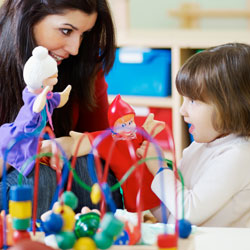On the 29th July 2018, the 3rd biennial Childhood Trauma Conference commenced, run by the Australian Childhood Foundation. Running for three days, the CTC offered a host of master classes and presentations by some of the world’s premier researchers and practitioners. This year’s conference was titled Trust, Love and Betrayal: Therapeutic interventions that work in the face of relational and complex trauma.
Addressing a topic this bold was no mean feat; yet the presence and power of play in most presenters’ speeches was undeniable. For example, Theresa Kesley, PhD, is a psychologist, educator, consultant and a registered play therapist/supervisor with the Association for Play Therapy. She spoke passionately about how play therapy can engage the right hemisphere, support left-right hemisphere integration and emphasised how play is a neural exercise. She highlighted how play allows simultaneous physiological activation in a safe way. Children can explore ‘high arousal’ activities that invoke positive emotions such as jubilance, excitement, joy and even silliness, without fear and with support to help regulation and integration between hemispheres of the brain. Likewise, play can allow ‘low arousal’ emotions from activities, such as feelings of calm, caring, gratitude and being pleased, which are just as important. The safe space to modulate such movements and depths of arousal are crucial to supporting children when working through experiences of trauma.
Dr Allan Schore, another author and researcher, discussed the power of play in his presentations. His ‘Regulation Theory’ is grounded in developmental neuroscience and developmental psychoanalysis. His contributions appear in multiple disciplines, including developmental neuroscience, psychiatry, psychoanalysis, developmental psychology, attachment theory, trauma studies, behavioural biology, clinical psychology and social work. His ground-breaking integration of neuroscience with attachment theory has led to his description as the American Bowlby with emotional development as the world’s leading authority on how our right hemisphere regulates emotion and processes our sense of self. He spoke of how essential “mutual love and mutual play” is from the onset of our development, from as early as two to three months of age. He stressed how “both mutual love and mutual play expand the child’s capacity to tolerate high levels of arousal” and becomes the neurobiological substrate for ALL future play for the child or young person.
With even the most well-respected authors, researchers and practitioners in the world acknowledging the power of play for children who have suffered trauma, it comes as no surprise the need for high quality play therapists is increasing in Australia. Play Therapy Practitioners Association seeks to build a community of like-minded, skilled, passionate practitioners who wish to see exceptional quality play therapy available to each and every child and young person who has experienced trauma or abuse. Join the association today to build your skills and grow your community through play – one little person at a time!
Mel James – MSW, BSW, BA, MAASW (Acc) PTPA board member




Leave A Comment